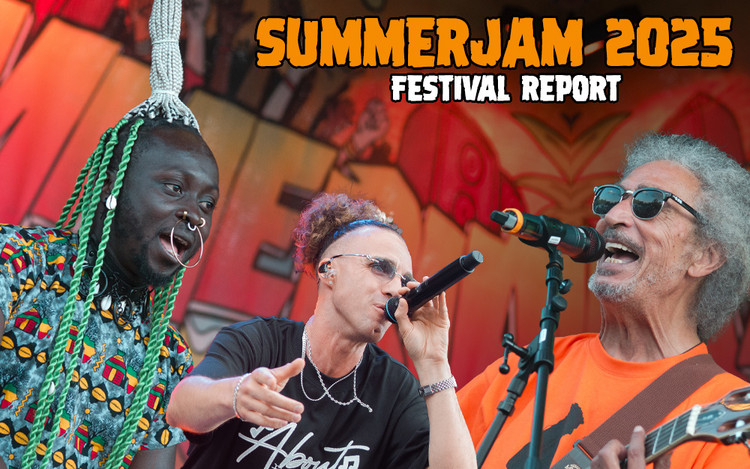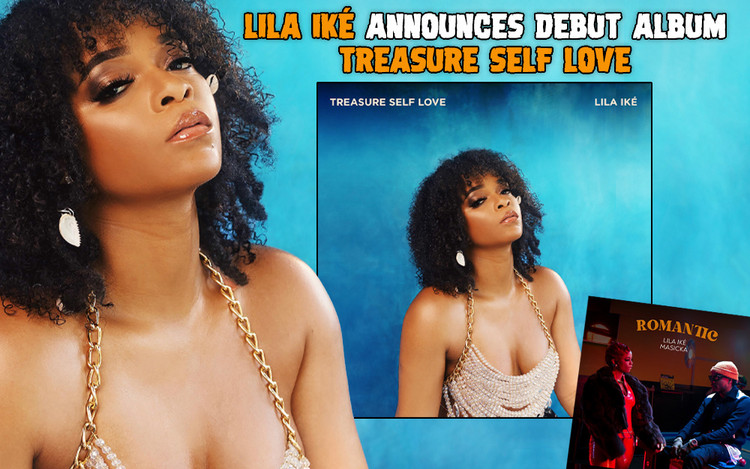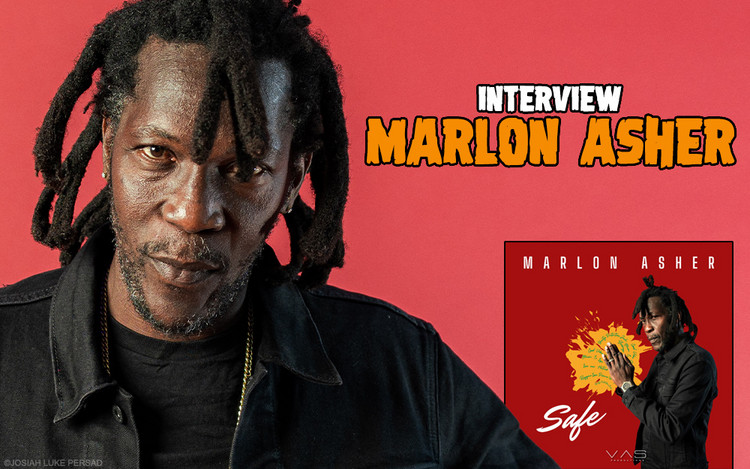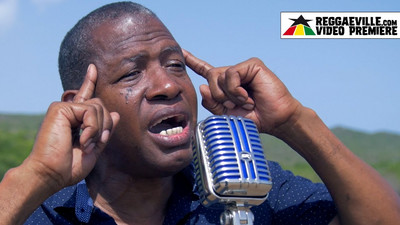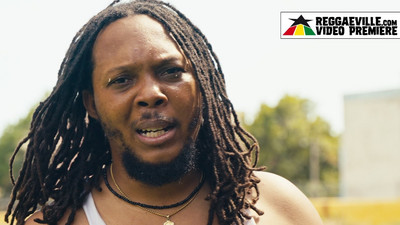The No-Maddz ADD
Interview with No-Maddz - PART I
01/28/2015 by Angus Taylor
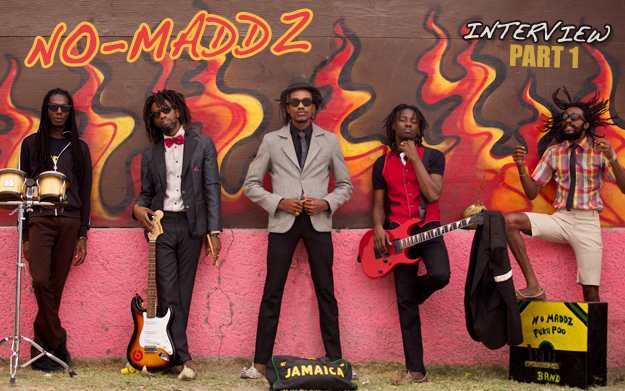
Take four dub poets and put them together, add singing ability and the acting skills of an improv troupe, and you’re halfway to understanding the savvy yet contrary Jamaican collective known as No-Maddz.
Unlike the Edna Manley College live band movement they are often grouped with, No-Maddz assembled at Kingston College High School. They are made up of four distinct personalities and skillsets: second generation actor and dub poet Sheldon Shepherd, Greenwich ghetto raised music student O'Neil Peart, revival church marketing wiz Everaldo Creary and performing artist broadcasting degree holder Chris “Birdeye” Gordon.
Despite 15 years of activity, numerous poetry awards and an endorsement deal with Puma that brought the group international attention, No-Maddz are only now releasing their debut studio album, produced by Sly and Robbie. Sly & Robbie presents No-Maddz is out this week – and finds the quartet in more of a conventional singing mode.
Angus Taylor spoke to Shepherd in Jamaica and Peart in the USA via three way Skype call. This two-part, in-depth interview is the result.
A foreign interviewer who hadn’t done their research might assume you had gone to Edna Manley?
(laughter)
O’Neil Peart: Oh well - no we didn’t!
Sheldon Shepherd: Yeah man!
But you actually met at high school at Kingston College.
Sheldon Shepherd: We started at Kingston College High School in the year 2000. We were all practitioners of the performing arts, doing dub poetry at the Jamaican National Cultural Development annual festival of the arts. So we met on that stage, pretty much. We were under the tutorship of Peter “Maestro” Heslop, helping us with theatre acting, music, drumming, dub poetry, standard English and Jamaican dialect pieces. Pieces done by Louise Bennett-Coverley, our mother of dub poetry and spoken word. O'Neil himself won the award for the Louise Bennett best Jamaican dialect piece and he won the Louise Bennett Award a few times in the solo category. I won the Dub Poetry award a few times in the solo category as well. So when No-Maddz collaborated in 2000 we did the poem Pressure which saw us winning the national and the regional finals with a 100% score. That was never done before and it has never been followed.
O’Neil Peart: As far as tertiary education goes Christopher Gordon went to Indiana State University, I went to Excel Community College, Sheldon studied at CPTC and Everaldo did a short stint at U Tech.
Sheldon, your father Keith is also a dub poet.
Sheldon Shepherd: I understood dub poetry because of my father. He was the type of father who would do dub poetry to the pregnant belly. He was always trying to make the environment lighter. Because we are from humble beginnings, you have to find ways to entertain yourself. We didn’t have running water or electricity in those days so we had to entertain ourselves with culture.
So that was how performance came into your life.
Sheldon Shepherd: That was how I got introduced to it. And because Jamaicans, we all attend church, and church is this place where you can express yourself as well as learning morals and all that. So we used to do singing in the choir, choral speech at the talent hunt. We are always active in performing and in performing competitions.
How did the performing arts figure in your background O'Neil?
O’Neil Peart: I started in the performing arts from about age eight. When I was at school there was a certain teacher I must name – Avenia Powell, who saw me and took me into the drama club because she felt I had some talent. From then I started doing some one foot man kind of thing and then a lot of poetry pieces. The thing about poetry for me was I used to get paid for it. As Sheldon said we are from humble beginnings and we really never had much money so the idea of being able to make some money so that I could actually go to school was something for me. So I never minded going on stage and performing because I said “This is the ticket!” (laughs) When I found the ticket I said “Alright, I’m just going to be the best at this. If I’m not the best, I’m going to be one of the best and be hard to compete with”. So I just continued and continued from primary school straight into high school and even into tertiary – which is why I ventured out more into the arts and did music at Excel Community College. The arts for me is a living. Something that freed me up and I never looked back.
You mentioned you were from humble beginnings whereas there tends to be an assumption with most of the Edna Manley bands that they are from more affluent backgrounds.
O’Neil Peart: That is true (laughs). Edna Manley is Edna Manley and it does what it does. It is a very small school in comparison to the amount of musicians that you have in Jamaica. The majority of the people are not necessarily from Edna - but it is the school that always gets the praises and the credit. You do have to praise it definitely. But you do have musicians that are from different churches and schools and other places.
Describe the environment of Kingston College and how it nurtured the four of you.
O’Neil Peart: I was already being ushered into KC because my brother went to KC. But there is something about KC, a certain level of brotherhood it teaches. The first thing is it is an all-boys school. Growing up I used to say “I never want to go an all-boys school because of pure boy and we never see no woman” but going there you see you have things there to take your mind off the distraction that would have been girls for me! I think if I went to a co-ed school maybe I would not have turned out the way I turned out. When you go to KC you have a certain level of pride about your school – the whole atmosphere is everything.
Sheldon Shepherd: Kingston College was founded by Bishop Percival Gibson. Bishop Percival Gibson used to attend St George’s College. In those days St George’s College, Wolmer’s Boys, Jamaica College, they were pretty much plantation owned schools that only catered for the upper classes and the wealthy youths of Jamaica. Bishop Percival Gibson saw it fit and necessary to implement a school that would provide for the diamond in the rough. The whole analogy and metaphor about how a coal under pressure becomes a diamond. These less fortunate youths who cannot really afford secondary and tertiary education, they tend to get left behind. Kingston College provided that haven, that academy for these youths to be the best that they can be. That is what I felt at Kingston College because Kingston College allowed you to know the history of KC. So you have a sense of pride and you feel as if you must come out to be something. You get an opportunity and you have to make it work. 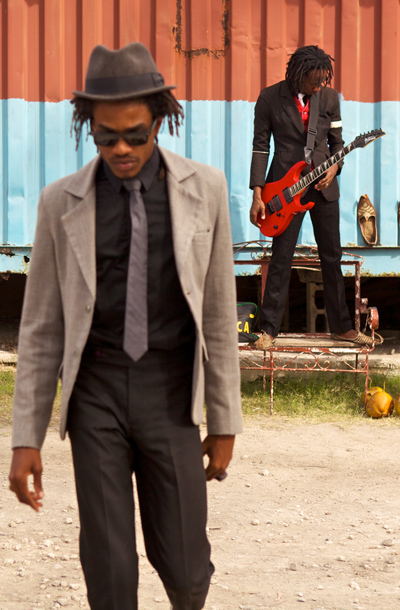 Historically KC has turned out some alumni who went on to be part of the music fraternity. The producer Clive Chin for example, and the singer KC White – correct me if I’m wrong but doesn’t the KC in the name KC White stand for Kingston College?
Historically KC has turned out some alumni who went on to be part of the music fraternity. The producer Clive Chin for example, and the singer KC White – correct me if I’m wrong but doesn’t the KC in the name KC White stand for Kingston College?
Sheldon Shepherd: I will have to research that, Angus. I don’t know if KC stands for Kingston College but you have quite a few musicians like the Fab Five.
O’Neil Peart: And you could be right about Clive Chin because Clive Donaldson from VP went there as well. A lot of the people from VP went to KC.
Sheldon Shepherd: A lot of musicians went to Kingston College. Little Lenny, the dancehall artist and many others. Because when you are a wealthy man, you don’t really influence your children to become musicians because it’s a tough job and you have to be the best or right up there with the best to see any form of income from this job. It’s better you take your chances as a lawyer, a doctor, an Indian or a Chief! (laughs), because there is a blueprint for those traditional jobs. With music it is like, if you’re lucky. Because sometimes it is not even based on talent – it is based on who can pay the most payola to get your songs played on the radio.
O’Neil Peart: And adaptability. Your adaptability has to be very good because you have to be able to change within an instant. As soon as the market changes, you have to be able to change. This is one the things about music that makes it hard. Other jobs tend to be very one way – you know the pattern, study this this this. Music? It might be this today and that tomorrow.
You mentioned the Fab Five – your producers Sly and Robbie actually met and started playing together because the Fab Five went to America.
Sheldon Shepherd: I’m going to have to have to ask Sly about that history.
O’Neil Peart: I’m going to ask him as well. I love the history lesson, Angus.
You’ve probably been asked this many times before but dub poetry is traditionally performed solo. How did you come to form a dub poetry ensemble?
Sheldon Shepherd: It started at KC because the Jamaican Cultural Development Commission came up with the idea. We always had speaking ensemble groups but you never had a dub poetry ensemble group, so the JCDC wanted to explore that option. Our teacher Peter said “Try it” because we were all winning individual dub poetry gold medals. We rounded up the best seven of us and we did Pressure and from then on we realized that this dub poetry group has a tremendous power bigger than any one individual dubber or performer. Because you are talking about seven different energies coming together to make one. Dub poetry to me is even better with a group because everything is better with a group. You have variations, you have various textures, harmonies.
O’Neil Peart: It’s like the European Union or the United States of America. You bring many different states together to make this one powerhouse. That’s what I think No-Maddz is because at the time we were all competing against ourselves and were very talented – all getting 90s. So when we combined this force you can imagine how it was to people.
What was the genesis and meaning of the name No-Maddz?
Sheldon Shepherd: We gathered around the table in the Kingston College canteen to decide on a name for this new group we just formed. It was four of us sitting around the table – myself, Everaldo Creary, Errol and Shane – who are not members of the group any more. So we were sitting down discussing names and someone frivolously said “Better, we call ourselves Nomads”. When he said that it sparked a flame in my creativity and my being. I stopped the discussion and I said to them “Why NOT Nomads?” and I saw the light in everybody’s faces.
Then we all started to find out the meaning of the word Nomads because history tells you that the Nomads were the first people. Because people have to find out about themselves so what they do is they wander. They trek in search of food, vegetation, they study and they learn things. They wander, not for any particular purpose but just to discover new things. So we said we are “No-Maddz” because our style of dub poetry is different. So we used a hyphen to separate the No and the Maddz to say that we are not mad! (laughs) Although it might look like we are crazy there is sense to the madness! It’s a poetic name because we all came from poetry.
Though this be madness, yet there is method in it.
Sheldon Shepherd: Method to the madness!
What happened to Errol, Sean and the other members from the original seven piece?
Sheldon Shepherd: Errol migrated to London, England where he lives now, when we were in the 11th grade just after he graduated. Just as we were poised to take on the world with this new dub poetry movement one of our stronger poets had to leave. It was really distressing for us. Shane he has always been a busy one up and own and he was always a ladies man (laughs). He got two kids right out of school and decided to jump into a job to support them.
So it was me, Everaldo and Chris Birdeye, going around doing a lot of dub poetry shows. O'Neil was always in the group from high school but when we left high school O'Neil went his separate way to study music. One day I was at Excel Community College and I heard him play his acoustic guitar. It was amazing and the element of that sound was very necessary so I spoke to the other two members and said “Listen, we should bring in O'Neil yunno”. And the others said “No bother bring in O'Neil man! O'Neil unruly!”
(laughter)
And I said “Nah, I just listened to the man and we just have to work with the man”. So one day I saw him and I reasoned with him and he was typical O'Neil Peart, shoulder shrugging like “Ok, whatever” so we were still a bit sceptical like “Is that a yes or a no or a maybe?”
(laughter)
But it blossomed into what we have today. And it just goes to show that you can never judge someone by their exterior or by something that they said to you once on a particular day when they never had any lunch or whatever!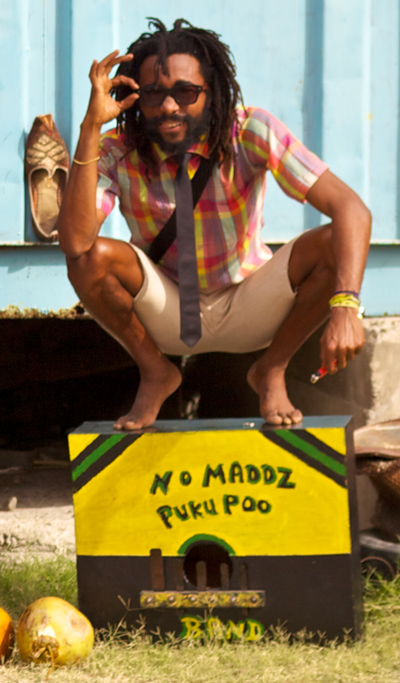 Why did you have this reputation for being unruly O'Neil?
Why did you have this reputation for being unruly O'Neil?
Sheldon Shepherd: Angus, O'Neil had a reputation for being an arsehole!
O’Neil Peart: (Laughing)
Sheldon Shepherd: But he was a confident no nonsense youth who wanted to get his point across and sometimes people confuse confidence for conceit.
O’Neil Peart: And that wasn’t what it was. My thing was never to try to insult people. My thing was to go out there and be the best. I cannot go on a stage and not go for it. I’m always going to go for those two points as they say in football.
My house was very poor so I couldn’t just chill out at school like the normal youths. I had to work out how I could make some money so I can keep going to school so that one day things will be alright for my mother? Also, when I did the last performance on the stage with No-Maddz in 2002 I said to myself “Yeah, I get it. A dub poem”. But to me it never seemed like it would impact the world as much as it did. I guess dub was not the main thing at the time. So when I went out I didn’t feel I had a great contribution to the group. I needed to bring something different.
Sheldon is a very good dub poet, Everaldo was coming into his own and Christopher was doing his thing – so it was three already dubbing. I’m Piscean and Pisceans will always look for the difference or look for that hit factor - and I didn’t think I had that at the time. When I went to Excel and they asked me to do a different major I couldn’t sing or play anything at all so I had to build from scratch. So when I learned a little guitar and had voice lessons I thought “Maybe this could be what I add”.
Sheldon Shepherd: So when O'Neil started to improve upon himself we started to take notice and invited him in to be a part of the production and the movement. And he never hesitated because he saw where his place was. He instantly started to slur, to play his guitar, to work on his voices to sing a couple of the choruses.
And it turned out to be perfect because if he had stayed with the band and remained stagnant we would not have had this evolution of sound. It would have remained a core dub group – and while there is nothing wrong with that – now we are multifaceted. We can give you hardcore dub, we can give you brilliant singing.
Now, you weren’t part of the Edna Manley thing but you were part of the Bull Bay live music thing that people associate with the Edna Manley bands and new roots revival.
Sheldon Shepherd: Yeah, that was Billy Mystic from Mystic Revealers at his surf camp Jamnesia. They had this live jam session every other Saturday night. We played there from 2007 for three years over at that spot. It gave us the platform to really own our craft and perform and present. But with every good thing you have to grow and find your wings and leave it so that other people can get the benefit from it. You can’t remain stagnant so we decided to leave Jamnesia after three years of playing every other Saturday. So then we did our live album [The Trod] in 2010 and made our official step into the commercial music industry. We printed our CDs and put them out in local coffee shops, got our own adverts done, and hosted our own live shows because no one wanted to book us because we were too different!
Germany has been pretty good to you. You went to Germany off the back of an endorsement from Puma – which incidentally is a German company.
(laughter)
Sheldon Shepherd: Puma came to Jamaica in 2010 and had this idea about running musicians. They hosted an audition and hired an agency to say “Calling all bands… calling all bands…”. So a lot of bands turned out. The Mystic Revealers, Fab Five, Raging Fyah, Rootz Underground and a whole heap of actors who could form a band and run around and do a thing. So we went there as the bongo band No-Maddz and we started to run around and sing Poo Puku Poo. The director Frederick Bond heard the song and was like “Amazing! Do it again! Do it again!” And we did it about 20 million times and they sent it to Puma and Puma loved it.
So we started to shoot, everything worked out and they impacted tremendously on our lives because of the platform that a company like Puma can give you. They gave us just enough that people could recognise No-Maddz and recognise our image. It was a one year contract and we never renewed because we and they were seeing things differently. But there is definitely the potential to renew in the future – there is never a closed door on anything. We love Puma and right up to now I can’t buy any other clothing because they have a spell on me or something!
O’Neil Peart: It’s a very good brand.
Sheldon Shepherd: We always pride ourselves as lions and when the mountain lion came into our lives it was amazing!
As No-Maddz it is pretty clear that you have travelled because Oneill you are in the USA and Sheldon you are in Jamaica right now.
(laughter)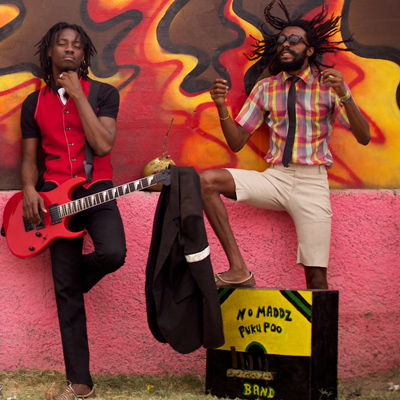 But it’s also clear that you went to different countries to learn your craft.
But it’s also clear that you went to different countries to learn your craft.
Sheldon Shepherd: Yes we have. And we did a tour with Usain Bolt in 2011 that found us doing our own tour in Germany. The campaign was called Faster is Funner and they were advertising the new fast shoe using Usain Bolt and No-Maddz and they wanted to push it all over Europe. We were invited just to show our faces and take pictures with the people so we opted to go. We did the victory lap at the Diamond League in France with Usain when he won. O'Neil was hurdling with his guitar in hand!
(laughter)
It was mainly fun for us.
O’Neil Peart: We were all track fans so it was nothing to us. We are always talking about running and we are all athletic. We really are the fastest band, so tell any band out there!
How did you settle in Germany?
Sheldon Shepherd: We did Trod Live and got some money from the Puma deal so we purchased tickets for all our musicians and rented a flat in Essen in Germany. We based there and it was like a hub. We rehearsed every day, cooked food and made phone calls to various festivals to see if they would book us. It was such short notice because it was already in summer and festivals were right upon us and they didn’t know us.
So we hosted a few events for ourselves and we gathered a few press around it and when they saw us they said “Hey, these guys are great” so they started to help spread the word. So when we made the phone calls it was a bit easier because they had already heard of us. We have to bless up the band Still Cool – Joseph Grant the leader singer was our chaperone in Germany. Our manager at the time Yakub was the son of Still Cool. We learned a lot because when you have to travel you have to learn. We learned a little German.
O’Neil Peart: And we met Ellen and Pete [from Riddim Magazine]. They kind of took us in.
Sheldon Shepherd: I have to always be grateful for the works of Ellen and Pete. They were lobbying for us.
O’Neil Peart: And they still are.
Sheldon Shepherd: They put us on the cover [of Riddim] when no one knew us. I have to always give them kudos for that.
Read part two of this interview with No-Maddz HERE




